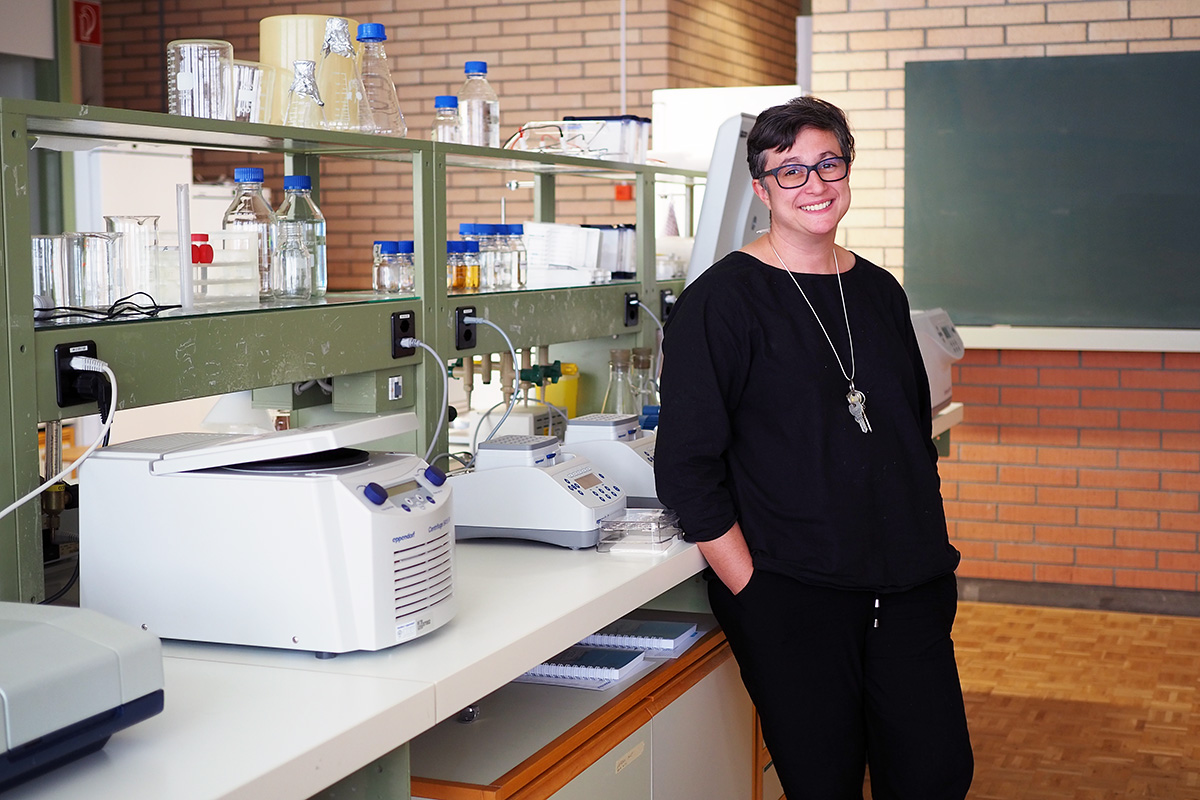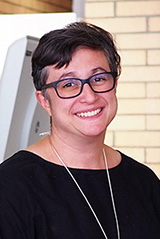"The pursuit of a professorship requires hard work, courage and patience"
Carmen Faso is one of the first recipients of an SNSF PRIMA grant which target outstanding female researchers who have professorial potential. The cell biologist recently started her research project on intestinal parasites at the Institute of Cell Biology of the University of Bern.
You are one of the first recipients of an SNSF PRIMA Grant. PRIMA stands for "Promoting Women in Academia". The Grants promote outstanding women researchers who have professorial potential. What does the grant mean to you?
Carmen Faso: This grant means that I have a wonderful opportunity to apply all that I’ve learned over the past years to lead my own research group and develop as an independent researcher. My professional goal has always been to become an independent academic researcher, to establish my own laboratory and line of research and to mentor junior colleagues towards developing independent academic careers of their own. This grant brings me significantly closer to achieving my aims.

Your PRIMA project called "The road less travelled: Parasites as models for unconventional protein secretion at the host-pathogen interface" started this month. Can you explain in simple terms what the research project is about?
In simple terms, the project is about communication. Parasites are pathogenic organisms which rely on molecular communication with their hosts to sustain their nutrition, reproduction and dissemination. The identification and investigation of mechanisms that underlie the constant flow of molecular information between parasites and hosts is the focus of the project and a topic that has captivated me for several years. I will begin to address this challenge using Giardia and Entamoeba, two one-celled intestinal parasites as my “living laboratory”. I am lucky to be collaborating with experts across Europe in this project and to have recruited two excellent team members.
Most people would probably choose something else than intestinal parasites as a research object. Why are you fascinated by them?
Good question. As a biologist, I am always flabbergasted by the myriad ways in which the same basic operations have been reinvented and reengineered across the astounding diversity of life. Giardia and Entamoeba have evolved to do what our own cells do, using different building blocks within cells with a much simpler architecture compared to our own. This means that we can use these species as simplified models to study processes that in our own cells may be too complex to dissect.
Please describe a typical working day.
I started my appointment on the 2 September so I am still struggling to establish a routine since the past week has been fraught with meetings, safety trainings, learning how to make the best of 4 hour commutes etc. Right now, my day starts with sorting through e-correspondence on the 6.30 a.m. train from Zurich, grabbing a coffee at the station in Bern, defining plans for the day with my lab manager, coming up with long lists of reagents that are needed to perform experiments and overseeing full equipment of the lab. We will launch the full operation in October.
The PRIMA grant includes your salary and project funds over the next five years. How will you use the project funds?
The PRIMA grant has been already used to employ Dr Wirdnam as my collaborator and lab manager. In addition, Mrs Balmer, a doctoral student, will start her PhD in my group in January 2020. The grant generously covers laboratory consumables and reagents, and the usage of services such as the Proteomics Mass Spectrometry Core Facility at the University of Bern, the Center for Image Microscopy and Image Analysis at the University of Zurich, cloud computing and data storage at the S3IT unit of the University of Zurich and for the BlueCrystal high-performance computing platform at the University of Bristol, two short research stays abroad and finally, costs for open access scientific publishing.
You moved from the University of Zurich to Bern with the PRIMA Grant. Why did you choose Bern?
There are a number of reasons why the Institute of Cell Biology at the University of Bern proved to be an ideal location. The ICB is dedicated to cell biology and one of its three thematic foci is molecular parasitology, my main discipline. Furthermore, it is a very supportive and highly productive institute which is perfectly suited to a budding group leader. Last but not least, Bern allows for a satisfactory professional-personal life balance in terms of commuting time from Zurich, where my family and I are currently based.
The SNSF has launched PRIMA to address the underrepresentation of women among professors. Why are grants like PRIMA so important? What were you own experiences?
I cannot say whether my career has so far been impacted by my gender, I did not perceive this till now. Nevertheless, it is apparent that gender balance in the higher academic management tiers has not been achieved and this is something that should concern us all, given that the majority of early career researchers is female. To complement this state of things, I have experienced very few female academic career models and the most impactful mentorship has come almost exclusively from male advisors. This is worrying and the PRIMA granting scheme is a welcome tool to tackle this issue directly.
What do you recommend to other young female scientists who want become professors?
Regardless of their gender, I would recommend any early career researcher to healthily question their personal motives for pursuing a professorship. This career goal and the professional and personal relationships one develops with coworkers can be incredibly rewarding. However, they are oftentimes reached after several years of precariousness and uncertainty. Therefore, the pursuit of a professorship requires hard work, patience, transversal skillsets, resilience to frustration, excellent collaborators, a good dose of luck and courage to uphold one’s objectives in the face of adversity.
ABOUT THE PERSON

Carmen Faso was born in Rome (Italy). From 1996 to 2003 she her pursued her BSc and MSc in Biological Sciences at the Roma Tre University (IT). She completed her doctorate under the supervision of Professor Wilhelm Gruissem at the ETH Zurich and received her title (Dr. rer. nat.) in 2008. After a first postdoctoral fellowship at the Plant Research Laboratory at Michigan State University (USA), in 2010 she joined Professor Adrian Hehl’s molecular parasitology group at the Institute of Parasitology of the University of Zurich, first as postdoctoral fellow and then as Oberassistentin-Junior Group Leader. Here, she unraveled molecular mechanisms involved in parasite cyst formation, growth and nutrition. In parallel, she developed skillsets in didactics, personnel and resources management, project management and scientific administration and publishing. In 2018, Dr Faso was awarded a SNSF PRIMA grant to start her own research group in September 2019 at the University of Bern.
Contact:
Dr. Carmen Faso
Institute of Cell Biology
University of Bern
Mail: carmen.faso@izb.unibe.ch
THE SNSF PRIMA GRANTS
The Swiss National Science Foundaundation PRIMA grants are aimed at excellent women researchers who show a high potential for obtaining a professorship. PRIMA grantees conduct an independent research project with their own team at a Swiss research institution.
PRIMA grants cover the grantee's salary and project costs for a five-year period. With this competitive grant, PRIMA grantees can carve out a name for themselves and take the next step up the academic career ladder: a professorship. The third call for proposals for PRIMA grants is open.
ABOUT THE AUTHOR
Ivo Schmucki is an editor and the "Nature and Matter" representative at the University of Bern Communication & Marketing Office.